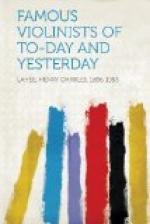When Ernst died the critic of the Atheneum compared him with other players of his day in the following words: “Less perfection in his polish, less unimpeachable in the diamond lustre and clearness of his tone, than De Beriot, Ernst had as much elegance as that exquisite violinist, with greater depth of feeling. Less audaciously inventive and extravagant than Paganini, he was sounder in taste, and, in his music, with no lack of fantasy, more scientific in construction.... The secret, however, of Ernst’s success, whether as a composer or a virtuoso, lay in his expressive power and accent. There has been nothing to exceed these as exhibited by him in his best days. The passion was carried to its utmost point, but never torn to tatters, the freest use of tempo rubato permitted, but always within the limits of the most just regulation.”
Among the violinists of this period (those who were born between 1800 and 1830) will be found those who first visited the United States. In 1843 Ole Bull found his way to these shores, and in the following year both Vieuxtemps and Artot were giving concerts in New York. A kind of triangular duel took place, for the admirers of Artot and Vieuxtemps, who were chiefly the French residents of the city, endeavoured to belittle the capabilities of Ole Bull, who nevertheless appears to have been very successful, and if anything, to have benefited by the competition. Musical culture was, at that time, in a very low state in America, and one may judge somewhat of its progress by the press criticisms of the artists who visited the country from time to time. It will be seen that those who, like Ole Bull, Sivori, and Remenyi, applied their talents to the elaboration of popular airs and operatic themes were able to elicit the warmest praise. Vieuxtemps appears to have appealed to the cultured minority and was understood and appreciated by very few.
Flowery language was used without stint, and was frequently misapplied in the most ludicrous manner, as will be seen by the following extract:
“Since the death of his great master, the weird Paganini, Ole Bull had been left without a rival in Europe. Herwig, Nagel, Wallace, Artot, and De Beriot can only ‘play second fiddle’ to this king of the violin. His entrance upon the stage is remarkably modest, and after the Parisian graces of Artot seems a little awkward; a tip of his bow brings a crash from the orchestra. He then lays his cheek caressingly on the instrument, which gradually awakes, and wails, and moans, like an infant broken of its slumber. Every tone seems fraught with human passion. At one time he introduces a dialogue, in which a sweet voice complains so sadly that it makes the heart ache with pity, which is answered from another string with imprecations so violent and threatening that one almost trembles with fear. We fancied that a young girl was pleading for the life of her lover, and receiving only curses in reply.




